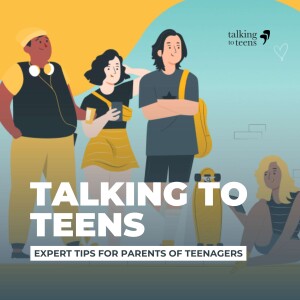
Talking To Teens: Expert Tips for Parenting Teenagers
Kids & Family

David Magee, author of Things Have Changed, joins us to explain today's teen addiction crisis involving social media, potent synthetic drugs and vulnerable mental health.
Bonfire Digital Wellness has a diverse team of seasoned, compassionate school counselors, ready to coach your teen. Check it out today and take advantage of a 1-month FREE trial: BonfireDW.org/talkingtoteens
Full Show Notes
Teen substance use has drastically changed in recent years. With skyrocketing rates of anxiety, depression and addiction, today’s parents are facing new and confusing challenges when trying to help their kids. We used to assume teens mainly struggled with peer pressure around drinking or smoking cigarettes. Now, teens face a host of new pressures tied to social media, a lack of sleep, and easy access to dangerously potent substances.
To help parents understand what’s really happening and how we can better communicate with struggling teens, we spoke with David Magee, author of Things Have Changed: What Every Parent and Educator Should Know About the Student Mental Health and Substance Misuse Crisis.
After losing his son William to an accidental overdose in college, David became an advocate for better understanding teen addiction. He now speaks nationwide to students and parents, and started the William McGee Institute for Student Well Being at Ole Miss.
It’s Not The Same Substances
Today’s teens aren’t using their parent’s drugs. While past generations struggled with alcohol, cigarettes or weaker strains of marijuana, today’s kids are taking synthetic drugs, often laced with fentanyl, that are exponentially more potent and dangerous, David explains.
He describes a current epidemic of fake Adderall pills being sold to high schoolers and college students. The counterfeit pills are never actual Adderall, but instead made of unknown substances designed to be addictive. Almost all contain fentanyl, says David. Kids think they’re buying a familiar drug, but it’s actually much more treacherous.
This is just one example of how substances have changed. David explains today’s marijuana can have THC levels of 70-90%, compared to just 4-8% in the 1990s. He says schools are shocked when drug tests come back 6 or 7 times higher than just a few years ago.
Social Media Enables Secret Addiction
David explains that the majority of illegal transactions happen over social media apps and payment platforms. Kids are finding connections on Instagram and Snapchat, then paying through Venmo or CashApp to stay under the radar.
Seeing multiple Venmo payments in and out of a teen’s account every day could signal that something is amiss, says David. He explains that parents needs to understand today’s digital landscape to spot warning signs. Punishment and phone monitoring usually backfires, while asking caring questions can help kids open up.
Focus on Feelings, Not Scare Tactics
Well-meaning authority figures often take a punitive approach, trying to scare teens away from substances through condemnation. But David explains this usually has the opposite effect, making kids feel ashamed in ways that increase their desire to use.
Instead, he suggests leading with empathy, compassion and care. Getting kids the right kind of therapy or counseling is crucial, preferably with someone who specializes in teen addiction. Building teens’ emotional intelligence through ongoing communication within families is key.
Above all, David focuses on helping teens cultivate sustainable joy in their lives, not just harping on what they shouldn’t do. He explains that happy, engaged teens are less likely to self-medicate through dangerous substance use.
If you found this episode helpful, check out David’s website at davidmcgee.com for more resources. His book provides practical guidance for parents and educators struggling with today’s newly complex issues around teen mental health and addiction. Please subscribe for more content that can help strengthen family relationships during the critical teen years.
More Episodes
 2024-11-03
2024-11-03
 2024-10-20
2024-10-20
 2024-10-06
2024-10-06
 2024-09-29
2024-09-29
 2024-09-22
2024-09-22
 2024-09-15
2024-09-15
 2024-09-08
2024-09-08
 2024-08-25
2024-08-25
 2024-08-11
2024-08-11
 2024-08-04
2024-08-04
 2024-07-16
2024-07-16
 2024-07-08
2024-07-08
 2024-06-30
2024-06-30
 2024-06-24
2024-06-24
Create your
podcast in
minutes
- Full-featured podcast site
- Unlimited storage and bandwidth
- Comprehensive podcast stats
- Distribute to Apple Podcasts, Spotify, and more
- Make money with your podcast
It is Free
- Privacy Policy
- Cookie Policy
- Terms of Use
- Consent Preferences
- Copyright © 2015-2024 Podbean.com





